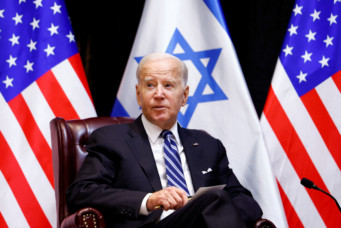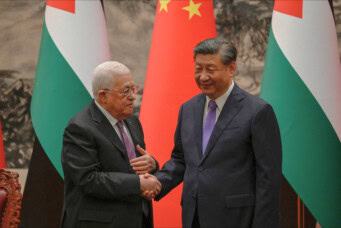Is China Becoming a Political Player in the Middle East?
China saw Israel’s war in Gaza as an opportunity to gain traction in the Middle East at the expense of the United States, but is it ready to become a serious political actor in the region?

China’s deepening engagement in the Middle East, particularly its potential to rival the influence of the United States, has become a focal point of international discourse. In recent years, China has transitioned its primary focus from securing energy resources to emerging as a leading provider of infrastructure and technology across the region. This shift, coupled with Beijing’s role in facilitating the 2023 rapprochement between Iran and Saudi Arabia, has intensified speculations about China’s ambitions to play a more prominent and enduring role in the Middle East.
However, China’s response to Hamas’ October 7, 2023 attacks in Israel and the Gaza War—characterized by assertive anti-American and anti-Israel rhetoric but limited tangible action—has prompted questions about Beijing’s willingness and capacity to assume a significant political role in the region. This ambiguity is further complicated by China’s involvement in reconciliation talks between Fatah, Hamas, and other Palestinian factions. This diplomatic engagement suggests a more nuanced approach, where China leverages opportunities for conflict mediation to position itself as a strategic player in the Middle East and beyond, rather than just an economic powerhouse.
China’s Evolving Engagement in the Middle East
Over the past decade, China has been expanding its presence in the Middle East. What started as a balancing act, primarily focused on economic cooperation and working with countries across regional divides, has become a more proactive approach, with Beijing seeking to expand its political and diplomatic influence in the region.
China began making significant inroads into the Middle East following the Arab Spring in 2011 and the U.S. pivot to Asia under the Obama administration. Washington’s decision to shift its focus toward the Indo-Pacific and away from the Middle East was perceived by both regional powers (like Egypt, Israel, and Saudi Arabia) as well as China as creating a vacuum that other influential actors could fill. Additionally, regional players, including U.S. allies, have grown increasingly disillusioned with Washington’s policies, such as the U.S. invasion of Iraq, former U.S. President Donald Trump’s withdrawal from the nuclear (JCPOA) agreement with Iran, the Biden administration’s hurried exit from Afghanistan, and its strained relations with Saudi Arabia. With the growing perception of a U.S. retreat from the Middle East—and regional actors’ desire to diversify their alliances and seek more reliable partners—China has emerged as a viable alternative.
Recent events, including the ongoing Israel-Hamas conflict, have further highlighted the evolving nature of China’s presence in the Middle East. The effects of superpower competition have become increasingly apparent, both in Asia and the Middle East. As the United States has sought to exert pressure on China in the Indo-Pacific, Beijing has increasingly moved to respond in the Middle East.
An Economic Power
Beijing’s economic activities in the region have expanded significantly, particularly after the introduction of President Xi Jinping’s Belt and Road Initiative (BRI) in 2013. China became the largest trading partner and source of investment in the Middle East in 2010 and 2016, respectively. Most Middle Eastern countries are signatories to the BRI. Though at first focused on energy, trade, and investment, China’s involvement now ranges across a spectrum of activities, including infrastructure and technology. Digital Silk Road (DSR) projects (focusing on technology and digital connectivity investments) currently represent the majority of Chinese projects in the region.
With the superpower competition between China and the United States intensifying, and China’s economic clout growing, Beijing’s ties with countries in the Middle East have become increasingly strategic for both sides. Technology in particular is gradually becoming key to China’s engagement with the region.
The growing alignment of interests between China and Middle Eastern countries has also been evident on the international stage, with several regional players joining the China-led Shanghai Cooperation Organization (SCO), and the recent accession of five Middle Eastern nations into the BRICS group. Notably, both organizations now include the increasingly ambitious Saudi Arabia and the United Arab Emirates, traditionally strong allies of the United States. This reflects the aspirations of regional powers to maintain their strategic partnerships with the United States while simultaneously reducing their reliance on Washington in order to pave a more independent path. By pursuing alternative economic, diplomatic, and security agreements with China and other global powers, these countries are signaling a shift toward a more diversified and autonomous foreign policy.
This policy shift has been particularly evident among the Gulf Cooperation Council (GCC). Chinese investments—in addition to the DSR and its aspirations for technological autonomy—present attractive opportunities for the GCC countries’ growing ambition to diversify their economies away from oil and become global technological and innovation hubs. Not only does Beijing provide them with lucrative economic opportunities, it does so without imposing conditions regarding democratic values and human rights ideals which are typical of Western-style foreign policy.
This strengthening of ties between the Gulf countries and China has been demonstrated by a substantial surge in investment throughout the past two decades. While China’s investment in Gulf countries stood at around $10 billion in 2000, it soared to more than $230 billion in 2021, with Saudi Arabia and the United Arab Emirates receiving the lion’s share.
A similar pattern can be observed in China’s ties with Israel. Sino-Israeli trade reached $21 billion in 2022 with Chinese companies engaging in around 500 investment deals in Israel over the past decade. For Beijing, the primary appeal lies in Israel’s high-tech industry—China’s investment in this regard peaked in 2018—and its technology sector.
However, the close ties between Israel and the United States, coupled with Washington’s increasing concerns over China’s access to Israel’s strategic and sensitive sectors, have complicated the relationship. In response to increasing U.S. pressure to limit its engagement with China, Israel introduced a foreign investment advisory committee in 2019 and rejected several Chinese bids related to security-sensitive infrastructure projects.
China’s Response to October 7 and the Gaza War
As China’s economic influence in the region grows, and following ongoing signs of waning U.S influence, Beijing has moved to position itself as a mediator and an alternative to Washington in recent years. Its successful role in the Saudi-Iranian rapprochement in 2023, alongside the growing frustration of regional powers over the Biden administration’s handling of the Gaza conflict, largely benefited Beijing and enabled it to mediate its way into the region’s security architecture. Beijing’s effort to pave its own path, one in contrast to the United States, has been particularly evident since the outbreak of the Gaza War in October 2023.
Beijing’s reaction to the October 7 massacre moved from notably passive—failing to condemn Hamas’ actions and calling for both sides to refrain from further escalating the conflict—to gradually becoming one-sided in favor of the Palestinians. It has also been marked by increasingly anti-American and anti-Israel rhetoric. Throughout the war, China’s traditional support for the Palestinians and claims that it has “always stood on the side of Arab and Muslim countries”, have gradually moved to the forefront.
China’s calculated shift toward a more assertive pro-Palestinian stance in the Israel-Hamas conflict reflects its evolving priorities in the Middle East. It indicates that Israel does not rank highly in Beijing’s strategic calculations and any damage to the Sino-Israeli relationship is considered manageable collateral in the broader geopolitical game. However, there are signs that Beijing is attempting to minimise damage to its bilateral relationship with Israel, if only rhetorically. Chinese diplomats have privately reassured their Israeli counterparts that Beijing is not seeking to undermine ties. As the conflict’s focus has shifted from Gaza to Hezbollah and Iran, this more conciliatory stance has also become visible in public statements, such as those referring to Israel’s “legitimate security concerns”..
Beijing has traditionally been a status quo player in the Middle East, carefully balancing its relationships across regional divides, with a strong preference for stability to advance its economic interests. However, growing tensions between the United States and China, alongside the region’s increasing role as a theater for superpower rivalry, have altered the strategic equation. While China does not want to see a regional war, it seems willing to tolerate some instability, particularly if it undermines the United States’ position in the region.
Rather than being driven by changing perceptions of Israel, China’s approach to the conflict should be viewed through the lens of its competition with the United States and its ambition to become not only the voice of the Global South but the leader of the “coalition of the oppressed” as well. This strategic posture harks back to the ideology of Mao Zedong, the founder of the Chinese Communist Party.
Beijing’s Strategic Conflict Mediation
For Beijing, the Israel-Palestine conflict is less about Israelis or Palestinians and more about its economic interests, standing in the region, relations with Arab countries and Iran, and strategic positioning vis-à-vis the United States. Throughout the Gaza war, China has leveraged the conflict as an instrument in its competition with the United States, seeking to discredit American influence while bolstering its own. Less mentioned is China’s goal to secure Arab and Muslim support for its stance on Taiwan and its policies in Xinjiang while accusing Western (especially U.S.) criticism of its human rights policies of being hypocritical.
In contrast to Washington’s firm military support of Israel, China has positioned itself first as a neutral peace-seeking entity and later as a unifying power aiming to resolve regional conflicts through dialogue. By doing so, China has been using the current war to achieve its broader and longer-term objectives, presenting itself as a voice of the Global South and a counterbalance to the United States whilst undermining Washington’s influence in the region. Thus, China is using the conflict as a tool in its discourse war with the United States.
Even with China’s apparent success in the public relations sphere in the Middle East, it has been less effective in positioning itself as a significant political player. Despite criticisms of Washington’s handling of the war, regional leaders still believe that only the United States can broker a solution to the Gaza conflict. China’s decision to facilitate discussions between competing Palestinian factions in July 2024 should be seen as an attempt to carve out a more concrete role in the conflict, particularly on the Arab side, once the fighting subsides. From a Chinese perspective, this move was less about promoting Palestinian unity and more about establishing itself as a potential political player in the Middle East.
By facilitating the signing of the Beijing Declaration in July 2024 China aimed to replicate the success and prestige it garnered following the 2023 Saudi-Iran agreement. However, the outcome this time appears more mixed. Given the complexities of internal Palestinian politics, the impact of the Beijing Declaration on the political reality on the ground remains uncertain. For China, despite the highly publicized signing, the negotiations and details of the 2024 Beijing Declaration were not made public, suggesting some uncertainty in Beijing regarding next steps.
Despite these mixed results, China’s political ambitions in the region should not be underestimated. While the United States remains an influential player in the Middle East, China’s economic model of cooperation, conflict management, and mediation are becoming increasingly popular among regional actors. Moreover, due to Washington’s strong support for Israel and its strained ties with Iran, it is seen as less effective in a region undergoing a reshuffling of traditional divide lines. Coupled with America’s categorization of Hamas as a terrorist organization, Beijing seems well-placed to mediate between rival Palestinian parties as the war between Israel and Hamas enters a new stage.
By holding these talks, China aimed to shape the political reality on the ground ahead of a future ceasefire and to counter the declared positions of Israel and the United States, which exclude Hamas as a legitimate part of the Palestinian political process. However, the killing of Hamas leader Yahya Sinwar in October and the recent shift of attention from Gaza to Lebanon and Iran have made mediation on the Palestinian track less relevant.
As the Middle East braces for another possible Iranian retaliation in response to Israeli strikes, Beijing could play an important role. With recent Israeli gains against Hezbollah and seemingly effective operations in Iran (and as the United States navigates its own leadership transition) Beijing may find itself well positioned to dissuade Tehran from escalating its conflict with Israel and sparking a wider regional war.
As the conflict expanded to involve both Israel and Iran, China initially leaned toward Iran. Recently, however, as the conflict’s focus shifted to also include Lebanon, China has adopted a more restrained approach, including a rare acknowledgment of Israel’s “legitimate security concerns”. This adjustment reflects Beijing’s efforts to align with regional sentiment, carefully adapting its rhetoric to changing dynamics while also aiming to preserve credibility. A more assertive stance on Iran by president-elect Trump might prompt China to deprioritize its relationship with Iran, especially if Beijing perceives Tehran’s position as weakened and increasingly complex in relation to U.S. and regional interests.
From Beijing’s perspective, during Trump’s previous administration, the Middle East stood out as one of the few areas where U.S. policy demonstrated a clear direction and tangible results. The Abraham Accords, in particular, caught China off guard. In a second term, Trump will likely aim to expand the Abraham Accords to include normalization with Saudi Arabia and increase pressure on Iran; on the other hand, he may also press Israel to conclude the war in Gaza, paving the way for a renewed attention on the Palestinian issue, particularly regarding reconstruction efforts.
After more than a year of conflict in the Middle East, Beijing feels it has gained some public relations leverage in the region at Washington’s expense. However, Trump’s return will likely compel China to adopt a cautious “wait-and-see” approach as his Middle East strategy—and stance toward China itself—comes into focus. China has shown an ability to adjust its regional strategy, capitalizing on emerging opportunities as situations evolve.
While competition with the United States plays a central role in shaping China’s growing diplomatic ambitions, this does not imply that Beijing seeks to (or is capable of) replacing it in the Middle East, at least for now. Instead, these ambitions should be seen as part of a broader narrative war between the two superpowers, indicating China’s effort to assume a greater role in conflict mediation in the Middle East and beyond, within the framework of Xi’s Global Security Initiative (GSI). But for China to play a more meaningful role in regional and global conflict resolution, it will need to move beyond lip-service diplomacy to a more proactive approach, taking concrete steps to solidify its influence.
Endgame in the Middle East
As geopolitical realities shift and the Middle East gains greater importance, the interplay between China’s ambitions and U.S. responses will be a defining factor in shaping the region’s future. Simultaneously, the Middle East itself is in a state of flux, driven by the intensification of superpower competition, burgeoning regional ambitions, shifting alliances, and the escalating potential for conflict. All of this is compounded by the increasingly uncertain role of the United States in the region, especially as Trump’s upcoming return to the White House has thrown yet another spanner in the works.
China’s engagement in the Middle East should be viewed as a blend of strategic calculus and opportunism. While China’s offerings and the potential benefits it seeks from its regional partners are undoubtedly strategic, the relationships are still evolving. Both China and its Middle Eastern counterparts are actively seeking to maximize their interactions, often with the United States as a backdrop to their calculations. This dynamic underscores the complexity of China’s role in the region, where long-term strategic goals are pursued alongside immediate opportunities, reflecting a careful balancing act that continues to unfold.
So far, while China’s strategic moves in the Middle East have garnered public support and posed challenges to the United States, the long-term impact of these maneuvers remains uncertain. The region’s complex dynamics, coupled with the still critical role of U. S. political and military power, and Trump’s return, suggest that China’s influence may face significant limitations.
Beijing is acutely aware of U.S. presence, carefully navigating its regional strategy with a focus on both short-term gains and long-term objectives. As the situation in the Middle East evolves, China has an opportunity to demonstrate to still skeptical regional leaders that its role in the region can extend beyond rhetoric and that it can assert itself as a significant player in the region’s shifting power landscape. Whether China is prepared or able to seize this moment, however, remains uncertain.




